Kaiser and mental health care workers reach tentative agreement to end strike

This article was produced by Capital Main It is published here with permission The broadcasted end of a nearly -day strike by Kaiser Permanente mental strength care workers in Southern California will surely come as a relief to multiple of those employees Selected of them therapists psychologists social workers and others walked off their jobs last October What the strike s conclusion won t do for Kaiser patients is radically change a mental medical care system that is so dysfunctional it s been the subject of multiple fines and citations by the state yet shows almost no sign of improving To that end a California State Assembly bill is advancing to reimburse desperate Kaiser patients who have had to obtain their mental healthcare care outside the medical giant s system The Assembly s Committee on Vitality meanwhile scheduled a Tuesday hearing to examine Kaiser s continued failure to provide adequate behavioral wellness services And the state s Department of Managed Wellness Care which regulates Kaiser and other robustness providers in California in recent days disclosed that among the deficiencies it identified in Kaiser s mental wellbeing services in all but one remain uncorrected It s part of a larger trend going back more than a decade in which Kaiser has been dinged repeatedly by state regulators for running a system that doesn t come close to providing the mental wellbeing care that countless of its million California members want and need The fight goes on and now it s shifting to the state Legislature reported Sal Rosselli founder and president emeritus of the National Union of Healthcare Workers which represents the workers in Southern California The NUHW is a financial supporter of Capital Main Kaiser officers declined to comment on the contract agreement We will have no additional information until the conclusion of the ratification process commented spokesperson Terry Kanakri The strike s end communicated late Sunday night came after more than six months of off-and-on contract negotiations that mostly went nowhere Gov Gavin Newsom urged the parties to enter into mediation in February and while the union speedily agreed Kaiser refused to do so for nearly another full month claiming the union s contract requests made it clear that the NUHW was not a willing partner committed to engage in constructive negotiations Darrell Steinberg formerly a state senator and mayor of Sacramento was one of the mediators who at last helped broker a deal The other was Mark Ghaly who previously ran the state s Robustness and Human Services department under Newsom We would never have settled this contract without the help of those two mediators Rosselli disclosed We had to end this strike for obvious reasons after days and clearly Kaiser would have let the strike go on as opposed to rectifying the issues that were causing it Details of the agreement which is subject to ratification by the affected NUHW membership aren t yet known Union negotiators had sought in wage increases spread over three years in part to compensate for what they claim are years of workers receiving no cost of living increases The reinstatement of a suspended pension plan that Kaiser offers to almost all of its other employees Seven hours per week set aside for therapists to work on their patients cases outside of actual therapy sessions which is the current allotment for Kaiser s Northern California workers Rosselli revealed the new agreement will mark only incremental progress on improving recipient access to care and getting wages that are more in line with what other Kaiser curative professionals in Southern California receive During negotiations Kaiser agents portrayed the union s asks as exorbitant and claimed that Kaiser pays mental robustness professionals well above Southern California averages though it was not clear which sets of workers it was comparing For years Kaiser executives have maintained that there has been a substantial uptick in patients who want mental fitness care but not enough professionals available to be hired to meet the need Union representatives and various Kaiser therapists who ve spoken with Capital Main over that time counter that the company s pay and working conditions prevent it from successfully filling jobs Those same concerns led to a -week strike of Northern California Kaiser mental strength workers in which Steinberg ultimately mediated to a settlement The NUHW cites Kaiser s own statistics that shows about a quarter of the therapists hired in Southern California between January and September have already left their positions Nearly of those departed within the first months Kaiser s chronic failure to provide adequate mental healthcare services cost it a million fine in for insufficient case access and four years later it reached another settlement with the state on the same issues In the end in the Department of Managed Physical condition Care released a million settlement with Kaiser that included a million fine the largest of its kind in state history As the DMHC s new findings make clear Kaiser has moved at a glacial pace in correcting its systemic failures regarding mental and behavioral fitness care Among the issues that haven t been fixed a lack of follow-up appointments for ongoing patients failure to offer urgent mental wellbeing care appointments an inadequate system of external providers as part of Kaiser s system and failure to promptly reschedule appointments that have been cancelled or missed A bill introduced by Assemblymember Jasmeet Bains D-Delano would require Kaiser to reimburse mental healthcare patients who must seek care outside the clogged system It s backdated to May and wouldn t conclude until Kaiser has successfully completed implementation of the corrective action work plan identified in its settlement with the state That bill passed out of the Committee on Healthcare and has been referred to Appropriations In the meantime Healthcare committee Chair Mia Bonta D-Oakland called Tuesday s meeting Its agenda according to the posting of the hearing Kaiser Permanente s Behavioral Strength Care System Testimony is expected from a Kaiser person and a therapist DMHC representatives and union President Sophia Mendoza among others The agenda includes a space for an invited Kaiser representative no name was listed indicating that Kaiser had not accepted the invitation Capital Main is an award-winning nonprofit publication that reports from California on the the greater part pressing economic environmental and social issues of our time including economic inequality surroundings change strength care threats to democracy hate and extremism and immigration Copyright Capital Main


